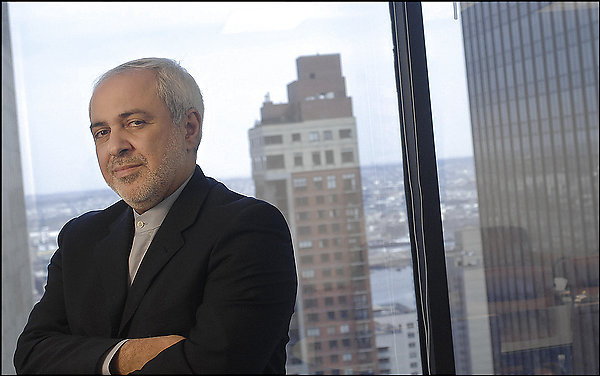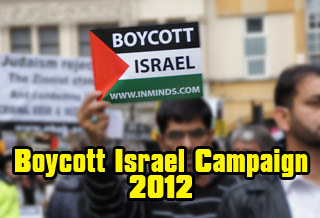
 Innovative Minds © 2014. All Rights Reserved. www.inminds.co.uk |
|
[Iran] Diplomatic ExitRobin Wright, Washington Post Staff Writer For Iran's Javad Zarif, a Curtain Call Behind the Scenes Javad Zarif, the highest-ranking Iranian diplomat in the United States, made a rare trip to Washington last month. The timing could not have been worse. Five days earlier, Iran's Revolutionary Guard had seized 15 British sailors in the Persian Gulf. The U.N. Security Council had just imposed new sanctions on Iran for failing to ensure that its nuclear energy program could not be subverted to make the world's deadliest weapon. Yet Zarif, whose five-year stint as Tehran's ambassador to the United Nations is about to end, was widely welcomed here, getting access that would make envoys from America's closest allies green with undiplomatic envy. He was even invited to Capitol Hill to chat with with presidential hopefuls from both sides of the aisle. "Zarif is a tough advocate but he's also pragmatic, not dogmatic. He can play an important role in helping to resolve our significant differences with Iran peacefully," Democrat Joe Biden said afterward. Noting his previous talks with the Iranian envoy, Republican Chuck Hagel called for "direct engagement" between Washington and Tehran. "Isolating nations does not fix problems," Hagel said. During Zarif's talk with Democrat Dianne Feinstein, Majority Leader Harry Reid and Republican John Warner of the Armed Services Committee dropped by to have a word. "I find him to be a positive, reasonable figure, and it would be useful if he could stay at the U.N.," Feinstein said later. Similar encomiums were heard as Zarif made the rounds of Washington think tanks. At a luncheon hosted by the Council on Foreign Relations, Martin Indyk, the former ambassador to Israel, turned to the Iranian envoy and said, "We're going to miss you." At a dinner hosted by the Nixon Center, its president, Dmitri Simes, introduced Zarif as "one of the most impressive diplomats I've met anywhere. He obviously is a strong spokesman for his country, but he knows how to do it with eloquence and credibility." All this transpired in just over 24 hours -- the time limit dictated by a special State Department permit that allowed him to leave the 25-mile quarantine imposed on Iranian diplomats at the United Nations.  Javad Zarif, Iranian envoy to the United Nations, was widely welcomed last month while in Washington. Ever since the Iran hostage crisis in 1979, relations between Washington and Tehran have devolved into a bizarre mix of non-communication, misunderstanding and occasional farce. With Iran's history of arming Iraqi, Lebanese and Palestinian militias, seizing British sailors, refusing to support Arab-Israeli peace, allegedly having a nuclear weapons program, and swinging from revolutionary to reformist back to hard-line politics, both Republican and Democratic administrations have struggled with whether there is any Iranian official that the United States can talk to -- and actually believe. Some U.S. foreign policy experts say Zarif may be one of the few. Simes compares Zarif to Anatoly Dobrynin, the legendary Soviet ambassador who served in Washington for a quarter-century during the Cold War. "Both countries were lucky to have someone who was willing to serve as an honest communication channel, who knew there were a lot of voices in both countries who wanted to destroy the relationship," says Simes. "Dobrynin's role was to keep a modicum of cooperation alive. That's what Zarif is trying to do." Others think Zarif is just more skilled at talking out of both sides of his mouth -- and that anyone in the current regime shares the same extremist agenda. "All their goals are the same. They all want to destroy Israel," says Kenneth Timmerman, executive director of the Foundation for Democracy in Iran and author of "Countdown to Crisis: The Coming Nuclear Showdown With Iran." "But there are tactical differences on how to achieve it," he says. "Some think they can trick the U.S. into making a deal that would be advantageous to the regime and keep it in power. Others are willing to be more confrontational. But there's no doubt that they're all out to get nuclear weapons." "He's very used to Western habits, so he is the perfect face for an unreasonable regime," says former U.N. ambassador John Bolton. "But he has no independent discretion on what he does." Before Secretary of State Condoleezza Rice's announcement last year that the United States was willing to join Europe in talks with the Iranians if they suspended uranium enrichment, Bolton was asked to deliver an advance text to let Tehran know. His secretary notified the Iranian U.N. mission and set up a time for Bolton to hand it to Zarif. But a half-hour later, the mission called back to say the Iranian government did not want a meeting. "I called him and said: 'I have to give you this piece of paper and you have instructions not to meet me. So what do we do?' " Bolton recalled. "We agreed to have it sent by messenger." Ironically, Zarif is suspect among hard-liners at home, too -- one reason analysts believe he is being recalled this summer. Zarif follows the rules of the revolutionary Islamic regime: He won't shake a woman's hand or wear a tie, which is disparaged as a symbol of the West. But he speaks English with an American accent after getting two degrees at San Francisco State and a doctorate in international relations at the University of Denver. He was at Denver shortly after Rice finished her PhD there in the same subject. "We had some of the same professors," Zarif says with a chuckle. He then moved to New York for his first U.N. posting, before going home to become deputy foreign minister. As he often notes, he has spent more of his adult life in the United States than in Iran. Both of his grown children are currently living in the United States. "In America, he's the face of the Islamic Republic, and in Iran hard-liners view him as the face of America," says Karim Sadjadpour of the Carnegie Endowment for International Peace. Being in the middle has taken a physical toll. Zarif's hair has gone from a little salt in a lot of pepper to snowy white during his time at the United Nations -- and he is only 47. Even unofficial dialogue between Washington and Tehran has been an elusive goal since the Carter administration broke off relations after the 1979 seizure of the U.S. Embassy. Each country has made overtures to the other, but rarely at the same time. The one connection imploded in the disastrous arms-for-hostage swap during the Reagan administration. Indyk, who served in the Clinton administration, recalls when he and two other State Department officials went to New York for a speech to the Asia Society by then-Foreign Minister Kamal Kharrazi. They dispersed around the room, Indyk says, to try to meet him. But when a mutual contact offered to make introductions, Kharrazi apparently got wind of it and quickly left. On another occasion, Secretary of State Madeleine Albright attended a small U.N. meeting on Afghanistan in part to have contact with her Iranian counterpart, Indyk says. But the Unites States knew so little about what Iranian officials looked like that they did not realize he had sent his deputy. The foreign minister had skipped the meeting to avoid the potential controversy at home of meeting with Albright. After the 9/11 attacks, diplomats from the two countries began to actually meet when they were in the same room. In 2001, Zarif was Iran's emissary to U.N. talks on the future of Afghanistan after the Taliban's ouster. In Bonn, Germany, he met daily with U.S. envoy James Dobbins, who credits Zarif with preventing the conference from collapsing because of last-minute demands by the Northern Alliance to control the new government. "It was about 2 in the morning," Dobbins recalls. The Northern Alliance, an ethnic faction backed by the United States, Iran and Russia, insisted on 18 of 24 ministries, excessive given the population and political realities, Dobbins says. "Finally, Zarif took him aside and whispered to him for a few moments, after which the Northern Alliance envoy returned to the table and said, 'Okay, I give up,' " says Dobbins, who is now director of the Rand Corp.'s International Security and Defense Policy Center. Assigned to the United Nations in 2002, Zarif met three times in 2003 with then-National Security Council staffer Zalmay Khalilzad or Ambassador Ryan Crocker about Afghanistan and Iraq, a tentative behind-the-scenes effort that died after a massive suicide bombing by al-Qaeda in Riyadh that initially appeared to have possible Iranian links. Since then, Zarif has continued "Track 2" diplomacy. In 2005 he agreed to a dinner-party debate on Iran's nuclear program with Robert Einhorn, former assistant secretary of state for nonproliferation, sponsored by the International Crisis Group and hosted by board member George Soros. Einhorn is among those who believe that Iran is worth dealing with -- eventually. "I'm not sure it would be productive at this juncture," he says. "But in six to 12 months, if Iran comes to the conclusion that it's playing a losing hand and it needs a better deal, there is no one better than Zarif to do that." Last year Zarif participated in a Princeton seminar -- by video, as he could not get State Department permission to travel from New York -- when he was pressed on Iran's position on the Holocaust. President Mahmoud Ahmadinejad had just questioned whether it truly happened. As he has often said publicly, Zarif said he believed the Holocaust took place and that it was genocide and a crime against humanity. He then countered that the Palestinians should not have to pay the price for mass murder by the Germans. Only later did he learn that the questioner was Uri Lubrani, Israel's envoy to Iran before the 1979 revolution. "I asked him a very tough question. He is a very loyal and able servant of his masters," Lubrani recalls. "But I have a notion -- only a notion -- that he did not agree with his boss." And when former secretary of state James A. Baker III was working on the Iraq Study Group report, he went to dinner at Zarif's elegant diplomatic residence across from Central Park to talk about cooperation on Iraq. The most controversial section of the final report recommended diplomatic outreach to Iran and Syria to help stabilize Iraq. Unlike most of Iran's reclusive envoys, Zarif has also been a regular on American television, from "The Charlie Rose Show" to C-SPAN. But his willingness to talk doesn't mean any give in his defense of his country's positions: He insists that Iran is not interested in developing a nuclear weapon. He says Iran wants stability in Iraq, its neighbor. And he denies that Iran is trying to create a "Shiite crescent" running from Iran into Iraq, Syria and Lebanon. "It is a scare tactic," he said on "Charlie Rose" in February. On the issue of terrorism, Zarif counters the long list of extremist movements supported by Iran by noting that U.S. troops in Iraq are not taking action against the Mujaheddin-e Khalq, a group that is both the leading Iranian opposition group and on the State Department's terrorism list. What draws former U.S. officials and Middle East analysts to Zarif is his willingness to talk about solutions to policy differences. Arms specialists credit him with meeting American scientists to discuss ways to allow Iran to enrich uranium, while guaranteeing Tehran could not use it for bombmaking. As he prepares to leave the United Nations, Zarif warns that time is running out. "It would have been far easier to resolve the nuclear issue two years ago, a year ago or last week than it is now," he said at the Nixon Center dinner. "And it is far easier to resolve the nuclear issue today than in two or three months' time, after the next Security Council resolution against Iran. I know if you follow this path, you will have a few more resolutions and we will have a few more centrifuges spinning in Natanz." "The outcome is not resolution but greater confrontation on both sides," Zarif said. "That is not the path that is needed." The Bush administration remains skeptical. A senior State Department official, who spoke on condition of anonymity, says Zarif has presented a "user-friendly face" for the Iranian regime. "But the fact of the matter is that their behavior has belied his smooth diplomatic effort." Zarif is sanguine about his failure to bring down the "wall of mistrust," his mandate when he was originally dispatched by the comparatively reformist government of President Mohammad Khatami. Asked what he has achieved during his U.N. stint, Zarif says, "Not much. "I don't think that the West interpreted our openings and accommodations the way they should have. They interpreted them as a sign of weakness, whereas it was a genuine desire by people like me to change the nature of the relationship," he says. "Since it was misinterpreted, the reaction was disappointing and in fact only heightened tension and increased mistrust. "A stupid idealist who has not achieved anything in his diplomatic life after giving one-sided concessions -- this is what I'm called in Iran." Some U.S. analysts suggest that Zarif may have played more of a role than he realizes. "The history of relations since the revolution has been ships passing in the night," says Indyk. "When we were ready to talk, they weren't, and when they were, we weren't. We've never been able to get to the table. With him there, we had the best chance. Without him, it will be much more difficult." Source: http://www.washingtonpost.com/wp-dyn/content/article/2007/04/14/AR2007041401595_pf.html Also Of InterestPage URL: http://inminds.com/article.php?id=10013
|
|
Support Us
If you agree with our work then please support us.Campaigns INMINDS Facebook Live Feed Latest Video's
INMINDS Twitter Feed Tweets by @InmindsComFeatured Video's
You need Flash player 8+ and JavaScript enabled to view this video.
[all videos (over 200)..] Featured MP3 Podcast  "[Deportation at the airport] We saw the injured [Turkish] men going through.. a lot had a leg cut out of their trousers or an arm cut out of their top. It had been cut out to treat their wounds.. they were covered in blood, blood that had been there for three days, and some of them had wounds that were still bleeding.. What upset me most was seeing the dozen men, one after another, hobbling across the terminal, with a bandaged foot. I couldn't ask them why so many of them had a bandaged foot, I couldn't ask them what had happened, because if they spoke or if any of us spoke to them the Israelis beat the injured person.. We later found out that they had these injuries on the tops of their feet from when the troops came down from the helicopter on the Mavi Marmara, and they came down firing - they had been shot from above. Some of the men that were killed were shot at close range - head and chest, but a dozen of the men who were shot, among 59 people who were shot, they were shot at the tops of their feet - the bullets were coming down.. They weren't given a wheelchair or a pair of crutches, and if any of the other passengers stood up and tried to offer [help].. that person was dragged away and smacked by these Israelis. The Israeli soldiers sat on the floor, laughed and sniggered and made every one of these Turkish men hobble and hop all the way across, some 200 metres, everyone of them, one by one, made to do that purely for the sick amusement of the Israeli soldiers." Survivor of the flotilla massacre speaks candidly of her experience Ratstar Centre London, 22 July 2010 [46min / 42Mb] [all podcasts..] Newsletter Feedback |
 |
 |












































